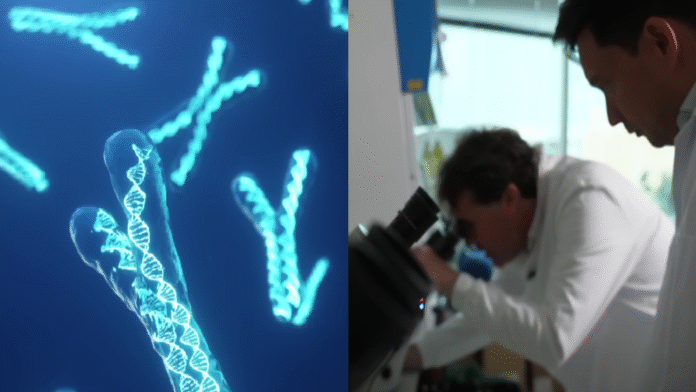[Source]
Researchers at five British universities have launched the Synthetic Human Genome Project (SynHG) with an initial grant of approximately $12.6 million from Wellcome, the U.K.’s largest biomedical research charity. Unveiled on Thursday, the five-year effort is led by molecular biologist Jason W. Chin at the Medical Research Council Laboratory of Molecular Biology in Cambridge and aims to assemble an entire human chromosome, base by base, inside the lab.
Writing a genome
Instead of tweaking existing DNA with tools such as CRISPR, SynHG will attempt to “write” long stretches of code before inserting them into cultured human skin cells to study how chromosome architecture drives health and disease. The project builds on Chin’s earlier success constructing a fully synthetic E. coli genome.
The laboratory playbook blends generative-AI sequence design with high-throughput robotic assembly, allowing scientists to plan and assemble millions of DNA bases. Patrick Yizhi Cai of the University of Manchester, who oversees these methods, says the approach “leverag[es] cutting-edge generative AI and advanced robotic assembly technologies to revolutionize synthetic mammalian chromosome engineering.”
Trending on NextShark: Chinese police are arresting ‘boys’ love’ writers
Why experts are cautious
Geneticist Robin Lovell-Badge of London’s Francis Crick Institute emphasized the importance of understanding not only the scientific potential but also the societal values and risks involved. He warned that as research progresses, there is the possibility of creating synthetic cells that could, if used in humans, lead to tumors or produce novel infectious particles if not carefully designed. Lovell-Badge recommended that any engineered cells should include safeguards, such as inducible genetic kill switches, to ensure they can be eliminated from the body or targeted by the immune system if needed.
Sarah Norcross, director of the Progress Educational Trust, echoed the need for transparency and public engagement, highlighting that synthesizing human genomes is controversial and requires researchers and the public to be in active communication. Norcross welcomed the project’s built-in social science program, which surveys communities across Asia-Pacific, Africa, Europe and the Americas as the science unfolds and is led by social scientist Joy Yueyue Zhang, as a way to ensure that public interests and concerns are considered from the outset.
Trending on NextShark: Andrew Schulz cast as Hong Kong-born Dan Hibiki in live-action ‘Street Fighter’
Road ahead
Over the next five years, the consortium will iterate design–build–test cycles, aiming first for an error-free synthetic chromosome representing roughly 2% of human DNA. Alongside the laboratory milestones, the team plans to release an open-access toolkit covering both the technical and governance lessons learned.
Trending on NextShark: Starbucks killer? China’s largest coffee chain makes US debut
This story is part of The Rebel Yellow Newsletter — a bold weekly newsletter from the creators of NextShark, reclaiming our stories and celebrating Asian American voices.
Subscribe free to join the movement. If you love what we’re building, consider becoming a paid member — your support helps us grow our team, investigate impactful stories, and uplift our community.
Trending on NextShark: American pride is at an all-time low, Gallup poll finds
Download the NextShark App:
Want to keep up to date on Asian American News? Download the NextShark App today!






